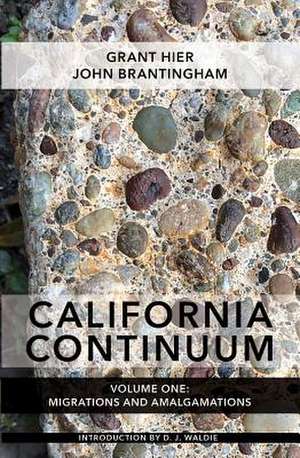California Continuum, Volume 1: Migrations and Amalgamations
Autor Grant Hier, John Brantinghamen Limba Engleză Paperback – 29 mar 2019
Rather than following a direct narrative, they explore themes that have run through California. One theme is the violence that is endemic to the state. For example, they write about various workers who helped to construct the brick that struck Reginald Denny. In another, they dramatize the California Water War that William Mulholland helped to ignite. They write about a number of the riots and civil uprisings in the state's history including the Zoot Suit Riots and the Rodney King Uprising.
Another theme is migration. California is a multicultural state whose history has been shaped by people following sometimes unrealistic dreams. They write about people who want to break into the movies, people fleeing war and terror, people looking for economic security, and people who are looking for freedom from racism.
In still another theme, they look at the way that the natural world has affected the people who have lived in the state. California's deserts, waterways, and forests have shaped and in many ways predetermined the way that the people of this area live, but that's not the whole story. There have been at least two competing edenic visions of California. The first is characterized by John Muir who saw the state as being perfect when it is untouched. He believed it was a kind of natural paradise and so do many of the characters of this collection. Another vision can be characterized by the way William Mulholland saw the state. He saw it as a paradise to be created where the potential for agriculture was unlimited, and that agriculture could create wealth and beauty. Other characters live inside this dream of the state.
Grant Hier and John Brantingham come to no hard conclusions about the history of California. They believe that conclusions negate the complexity of the state and exclude some of the more important aspects of any culture or period of time. When someone defines history, important details and people are inevitably left out. Of course, they are not able to capture all of the history of the state either; no one will ever be able to do so, which is why this is the first volume in what they hope will be a long series of books with many writers that extends beyond them. There is no way to completely capture California, but they hope a diversity of voices will be able to give a richer sense of the place.
Preț: 133.62 lei
Nou
Puncte Express: 200
Preț estimativ în valută:
25.57€ • 27.34$ • 21.32£
25.57€ • 27.34$ • 21.32£
Carte disponibilă
Livrare economică 27 martie-10 aprilie
Preluare comenzi: 021 569.72.76
Specificații
ISBN-13: 9781938349812
ISBN-10: 1938349814
Pagini: 258
Dimensiuni: 140 x 216 x 15 mm
Greutate: 0.33 kg
Editura: Pelekinesis
ISBN-10: 1938349814
Pagini: 258
Dimensiuni: 140 x 216 x 15 mm
Greutate: 0.33 kg
Editura: Pelekinesis
Notă biografică
Grant Hier is the Poet Laureate of Anaheim, California. He was the 2014 recipient of Prize Americana for his book Untended Garden, which was published by The Poetry Press in 2015, and nominated for both an American Book Award and the Kate Tufts Discovery Award. He was awarded the Nancy Dew Taylor Prize for Literary Excellence in Poetry in 2014 for his poem The Difference Between Rattle and Settling, and the Kick Prize for poetry in 2013 for his poem, Between Ellipses. Hier earned his BA in English at California State University at Fullerton, and both an MA in Literature and MFA in Creative Writing Poetry at California State University at Long Beach. For more than a decade he served as Chair of Liberal Arts and Art History and Faculty Senate President at Laguna College of Art ] Design where he remains as Full Professor, teaching courses in literature and creative writing.
